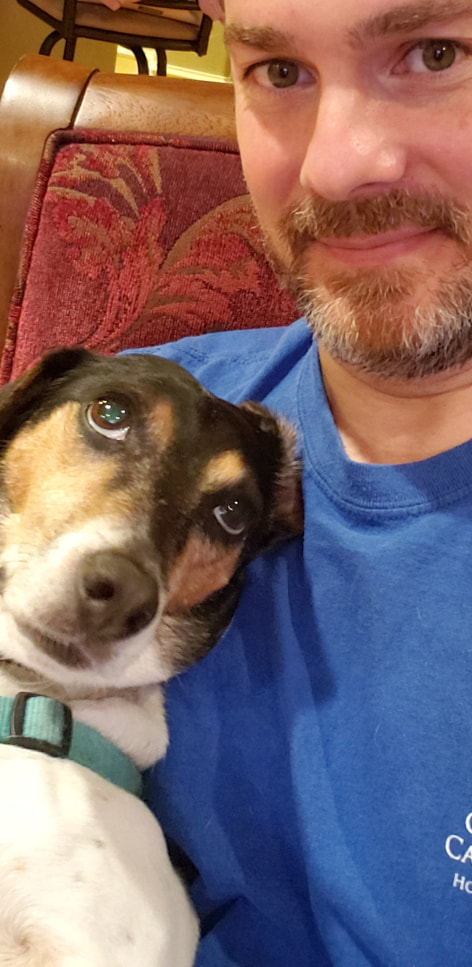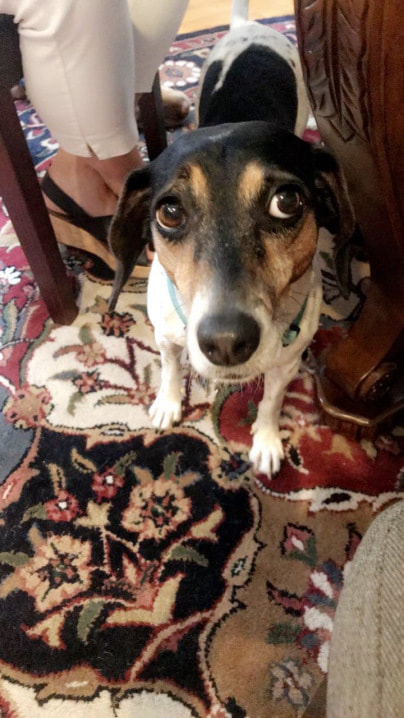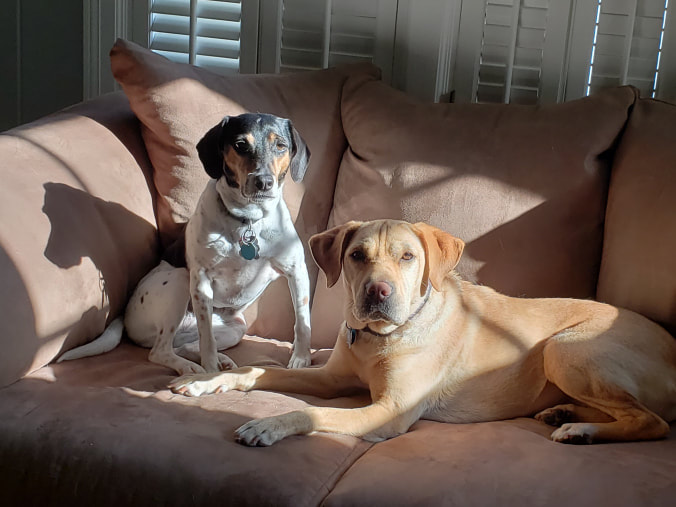- Home
- Process Worldview
- Community
- Art and Music
- Whitehead and Process Thinking
- Podcasts
- Spirituality
- Ecological Civilization
- Education
- Contact
- Social Justice
- Science
- Animals
- Sacred Poems
- Whitehead Videos
- Index of All Titles
- Practicing Process Thought
- Process Spirituality: A Spiritual Alphabet
- Recent Posts
Maggie the Pseudo-Beagle
Sunday, September 1, 2019 / The Very Reverend Barkley Thompson
“Look at those spots. I think she may have blue tick hound in her!” I said to my friend Bill H’Doubler, a fellow bird hunter and dog lover, as we sipped bourbon on my back deck. If Bill was skeptical, I didn’t notice. My family are beagle people, and since our beagle, Wrigley, was entering her twilight years, I’d decided it was time to add a puppy to our brood. Strangely, there were no beagles available anywhere near our home in Roanoke, Virginia, so I began casting a wider net. I purchased this puppy–advertised as a “beagle mix”–off of Craigslist. (And thus was born one of Jill Thompson’s maxims of life: “Never buy a dog off of Craigslist.”) I drove more than two hours from Roanoke to Bristol, Tennessee to retrieve her up from the back of a pick-up truck of a nice, vaguely methed-up fellow in camouflage. He was late, so he knocked ten dollars off the purchase price, and I had the pup for $60.
We named her Mary Magdalene, because she seemed possessed of at least seven demons (Mark 16:9). We called her Maggie. As Maggie grew, it quickly became apparent that the “mix” in her was not blue tick hound. Her frame was thin, compact, and wiry. Her disposition was fidgety and high strung. There is, of course, another breed distinguished by its blue-gray spots, and there was no denying that Maggie’s non-beagle half was rat terrier. And in Maggie’s case, the delicate nuances of her breeder (the methed-up Bristolite) seemed to ensure that she inherited the worst traits of both breeds.
When Maggie was six months old, I accepted the call to serve as dean of Christ Church Cathedral in Houston. I made the move in February, and Jill and the kids wouldn’t join me until school was out in May. I loaded up my Honda Element with a camp cot, Book of Common Prayer, shotgun, and Maggie. For four months, she was my only and constant home companion. I would come home after long days, she would greet me, and we would sit together on the kitchen floor as I ate microwaved chicken pot pies for supper.
As an adult dog, Maggie was alternately fearful and fearless. Thunderstorms terrified her, but at our place in the country she would harass and chase cows–and a bull–with reckless abandon. Over the years, we learned that there were three constants related to Maggie: She had occasional seizures, she considered other dogs’ poop to be a delicacy, and she loved me unconditionally. And I loved her. She was so odd and seemed so out of place in the world that she endeared herself to me. Her nickname became “L.D.,” which stood for both “Little Dog” and “Lovey Dovey.”
For the past several days, Maggie had been acting a bit off. She ate her food more slowly, and she seemed, at times, almost depressed. But she still loved walks; she still instigated wrestling matches with our other dog, a rescue named Mira; she still wanted my constant attention. Then, around noon yesterday, Maggie began losing strength. By 3 p.m. she couldn’t go up and down stairs. By 3:30 she couldn’t stand. By 4 p.m. we were in the car to the emergency vet. With one look at Maggie’s gums, the veterinary staff rushed her to an exam table. A quick syringe to her abdomen revealed that her gut had filled with blood. Something inside her had ruptured, most likely an undetected tumor. There was nothing the vet could do. By 5 p.m, Maggie had died.
The apocryphal Book of Tobit was written around 200 B.C. So far as I can tell, Tobit is the only biblical account–and surely one of the earliest written accounts anywhere–of a dog as a faithful human companion. In the book, Tobias must make a long and treacherous journey. Thankfully, God sends Tobias the Archangel Raphael as a protector and traveling companion. But apparently even an archangel isn’t enough. To make it in the world, Tobias needs a good dog. The author tells us, “The young man [Tobias] went out and the angel went with him; and the dog came out with him and went along with them.” (6:1-2; 5:16 in the RSV) Five chapters later, Tobias’ faithful, four-footed friend is still at his side.
From that ancient day to this, we love our dogs so. I have read that dogs are the only truly domesticated animals, which means when given the free choice, dogs choose to remain in the company of humans rather than be on their own in the wild. They are part of our families. They are our friends.
In the Thompson household, we’re very sad. My daughter, who loved Maggie as much as I did and who Maggie also loved, is especially so. Last night, Mira laid down on Maggie’s blanket, confused about where her friend had gone.
When I was in seminary, my classmate Bonnie Malone and I debated one another whether dogs go to heaven.
“Heaven is where we go to achieve our perfection,” I argued, “and since dogs are already the perfect embodiment of ‘dog,’ they don’t need heaven.”
“But Barkley,” Bonnie retorted, “It’s not heaven if my dog isn’t there.”
Bonnie wins. Take wing, Maggie. Chase haloed cows. I miss you.
reposted with permission from Rev. Barkley Thompson's Website


